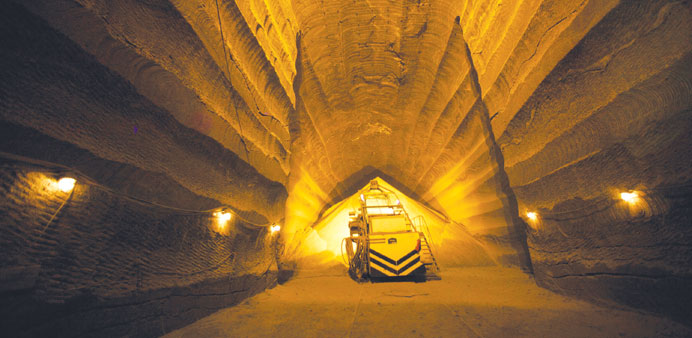A machine positions a pile of excavated potash ore in the OAO Uralkali mines in Berezniki, Russia (file). Uralkali rocked the global potash market late last month when it quit one of the world’s two big cartels and forecast prices of the crop nutrient could fall to $300 a tonne.
Reuters/Mumbai/Beijing
Potash buyers India and China are seeking aggressive price cuts of 25% or more as they press their advantage over producers after the collapse of a major cartel.
Russia’s Uralkali rocked the global potash market late last month when it quit one of the world’s two big cartels and forecast prices of the crop nutrient could fall to $300 a tonne.
India is aiming for an 11% discount off already agreed deals for the rest of 2013 — saving $90mn-plus — citing a weaker rupee and a trade-off between price and future sales growth.
China wants to pay less than $300 a tonne for new contracts for the second half of 2103 and 2014, down sharply from $400 a tonne in the first half and $470 last year, pointing to its high stocks of the fertiliser and rising domestic output.
“Prices above $300 will not be accepted by Chinese buyers, who are now facing high inventories at home and sluggish sales,” Wei Chengguang, chairman of China Potassium Salts Industrial Association, told Reuters.
“Chinese importers have been losing money in the first half and last year from high import prices,” he added.
China and India are two of the world’s biggest users of the crop nutrient. China imports about half of the 10-11mn tonnes it uses each year. Potash use in India, which relies on imports, has slumped from about 6mn tonnes to 3.5mn tonnes due to rising prices.
Uralkali’s decision to abandon Belarussian partner Belaruskali in the BPC cartel and boost its sales has encouraged buyers to expect increased production and greater competition.
“Uralkali will ignore pricing parameters and will try to maximise production and sales volumes, trying to raise its share in the markets where the company has competitive pricing advantage - India, China, Brazil,” chief executive Vladislav Baumgertner said at the time.
The BPC and North American Canpotex cartels accounted for nearly 70% of global potash sales.
Spot prices have slipped up to $50 in Brazil to $390 a tonne, while Uralkali has cut its potash price to China by $20 a tonne, Scotiabank analyst Ben Isaacson said in a research note.
India, which agreed in February to buy nearly 4mn tonnes of potash in 2013 at $427 per tonne on a cost and freight (CFR) basis, is seeking a discount for the more than half of the contracted nutrient which has yet to be landed at ports.
“We had asked for reduction to compensate 11% weakening of rupee,” P S Gahlaut, managing director at top potash importer Indian Potash (IPL), told Reuters in a text message.
“So far no confirmation (from sellers), but we are hopeful,” said Gahlaut, who has been leading negotiations with potash suppliers on behalf of Indian buyers.
The Indian rupee has fallen more than 10% against the US dollar since companies signed potash imports deals in February and is trading around record lows.
An official with a leading Indian co-operative fertiliser company said he expected most sellers would offer a discount to India in order to win new contracts.
“There is competition among sellers. India is asking to dispatch at $380 per tonne, but the way inventory is building up at the seller’s end, I don’t think they will have any problem in accepting this price,” the official said.
Uralkali and Potash Corp of Saskatchewan declined to comment on possible negotiations with India, but an industry source at a producer outside Canpotex and the former BPC cartel discounted talk of price cuts.
“I can’t see India getting any reduction in prices on existing contracts,” the source said.
There had been a lot of “noise” from India on re-negotiating prices and, in one case, a buyer contacted the firm to seek lower prices but did not send in an official request, he said.
A Russian industry source said the pricing of a signed potash contract had never been changed in the past. But the source pointed to a possible precedent in the phosphate market, when Phosagro agreed in 2011 to a discount on its contract with India in return for a pledge to purchase higher volumes.
India has said its potash consumption, which has been squeezed by higher prices, could return to levels around 6mn tonnes a year last seen in 2008/09 if suppliers made big price cuts.
However, Chinese officials said its push for lower prices would not be linked to increased purchases.
China’s domestic potash output would exceed 6mn tonnes in 2013, up from about 5.4mn tonnes in 2011, while domestic stocks would rise above 5mn tonnes.
“Even with the price fall, I don’t expect China to increase imports because of large inventories, while domestic production has been expanding. Imports should decrease gradually on a year basis,” said the industry association’s Wei.

